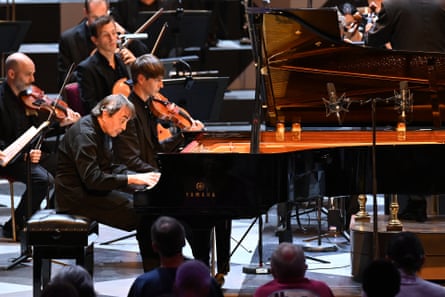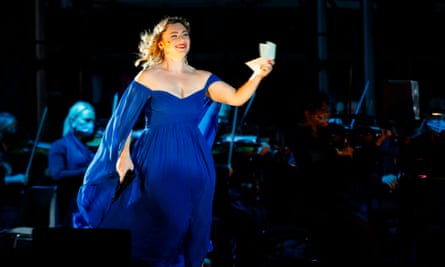Late in the day, with the Last Night in view, the Proms managed to squeeze one international ensemble, instead of its usual large handful, into the season. The illustrious Mahler Chamber Orchestra is a flexible group of players from 20 countries, which may have made the task of getting here easier – or not. Either way, the cheers on bank holiday Monday made clear their efforts were appreciated. This was a brilliant Prom, beautifully constructed and one of the best of 2021, with musical friendships at its heart. George Benjamin was the conductor in a programme of his own music as well that of his lifelong friend, the late Oliver Knussen. Another close colleague, Pierre-Laurent Aimard, was the ideal soloist in Ravel’s G major Piano Concerto, commanding all its aspects from jazzy to poetic, with a slow movement of unmatched melancholy.

Benjamin (born 1960) has worked with the MCO for many years. They gave the first performance of his successful opera, Written on Skin (2012). He has praised their golden sound, and the skill and virtuosity of each player. They merited the new Concerto for Orchestra he has dedicated to them, written in Knussen’s memory. The 18-minute single movement piece was given its world premiere on Monday, after three delicate Purcell consort arrangements by Benjamin (also premieres) and Knussen’s joyful, all too short “potpourri for orchestra”, The Way to Castle Yonder.
As with everything Benjamin writes, the concerto gleams, all the sonic ingredients individuated, clarity and intricate detail turning every player into a soloist. In this composer’s music it’s as if every bar, every idea, is an essence of the whole: an atom, more like the smallest in a set of Russian dolls. Dancing through the concerto’s buoyant, conversational exchange, dominating all, is the tuba. It is impossible not to hear this huge, lowest of brass instruments as the giant Knussen himself. After a gnarly orchestral climax, the tuba plays a long, triple fortissimo low note, then falls silent, leaving the rest of the ensemble, spare and ethereal, to spin into the ether, crotales ringing out softly.
One other Prom to mention: the BBC Symphony Orchestra, conducted by Sakari Oramo, played the Symphony No 5 by Malcolm Arnold (1921-2006) in his centenary year – the first of any of his nine symphonies at the Proms since 1994, which tells you something about his neglected status. Fashions change. Always praised as a film composer (The Bridge Over the River Kwai, Whistle Down the Wind), his concert music, melodic and passionate, was out of sync with the mid-20th-century ethos. Expect to hear more of him. Played with conviction, this was a moving and salutary reminder of what we have been missing. If you don’t know it, try it on BBC Sounds.
In the same year that Arnold completed his fifth symphony, the Crystal Palace Bowl opened, a canopied stage in front of a lake in the slim shadow of the TV mast, itself a novel landmark in a drab, postwar city. The London Symphony Orchestra was first to play there. Pink Floyd, Eric Clapton and Bob Marley followed. English National Opera has belatedly joined the pantheon, thanks to this year’s inaugural South Facing festival, which has stirred the venue, unused for several years, back to life. At a thunderous volume fit to blast a good deal of south London, transmitted via banks of speakers, ENO performed Puccini’s Tosca, conducted by Richard Farnes.

More concert performance than staging, ENO provided its audience with three outstanding singers: Natalya Romaniw, glorious and coquettish in the title role; David Junghoon Kim scaling his high notes excitingly as Cavaradossi; and Roland Wood as Scarpia, a smooth, rich-voiced thug. Orchestra and chorus excelled. There were a few chairs at the front, but for the full atmosphere you had to be sprawled on a blanket, preferably eating pizza and chips. The couple next to me, new to opera and having been at a pop festival the previous weekend, have now decided to book tickets for this autumn at the Coliseum. So a win for English National Opera at a time when they, like everyone in the performing arts, sorely need it.
Star ratings (out of five)
Mahler Chamber Orchestra/Benjamin ★★★★★
Tosca ★★★★
The Mahler Chamber Orchestra Prom is available on BBC Sounds

Comments (…)
Sign in or create your Guardian account to join the discussion